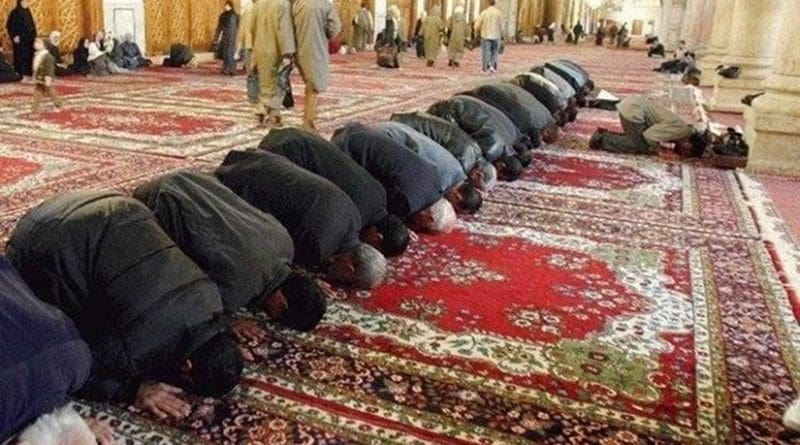Afghanistan: Mosques Turn Up The Volume
By IWPR
By Qayum Babak*
Haji Qiamuddin currently lives in the Baba Yadgar neighbourhood of Mazar-e Sharif city, right next to a local mosque.
His proximity to the religious institution had made his life a misery, he told IWPR. Five daily calls to prayer broadcast at high volume – as well as sermons, Koran recitals and other announcements – were proving to be a constant source of noise pollution.
No one in his family could hear themselves think, Qiamuddin explained.
“I have a child, and whenever something is broadcast through the loudspeakers he always starts, looks fearfully around and begins yelling,” he said. ‘It’s making him mentally ill.”
Qiamuddin said that it was particularly awful to hear scholars reciting the Quran through the loudspeakers during intimate moments such as while he was relieving himself in the bathroom or having sexual relations with his wife.
“Isn’t it a sin? These scholars make us and themselves both sinful,” Qiamuddin continued.
His pleas to mosque officials had gone unanswered, he continued. Finally, in desperation, he had put his house up for sale and was planning to move as soon as possible.
Residents of the Balkh provincial capital complain that frequent broadcasts from many dozens of mosques now amount to an unacceptable level of noise pollution. Officials say that they try to control the volume of broadcasts from registered mosques, but that other unlicensed centres of worship operated outside their control.
Hanan Hamid, in charge of mosques at the Balkh department of Hajj and religious affairs, acknowledged that he had received numerous complaints, with some Mazar residents even forced to move home.
Loud calls to prayer calls and in fact any religious practice that caused discomfort to others was not allowed, he said.
Almost 50 mosques were registered with his department, and his office was in weekly contact with them, he continued, noting that they were frequently warned to avoid annoying people with overly loud broadcasts from their minarets.
“The mosques that are registered with us accept our orders but the others do as they wish,” he said, adding that Koran recitations and other broadcasts were a fairly recent innovation.
Raziqdad Qulzari, acting director of Balkh’s Afghanistan Independent Human Rights Commission (AIHRC), confirmed that they had received dozens of complaints about environmental concerns, including noise.
“Sound pollution is any kind of loud noise which causes people discomfort including car horns, ambulance sirens, loud music in wedding halls and record shops as well as loud calls to prayer and other things,” he said.
Balkh mayor Jan Mohammad also agreed that noise pollution was a concern in the city.
“When I travel through Mazar-e Sharif, I am forced to put my fingers in my ears because of the sound pollution,” he said, vowing to clamp down on the problem.
Locals say they want something done about the issue.
“In all the developed countries of the world, followers of religion cannot disturb other people to hold their religious ceremonies,” said Mazar resident Zakir Zarifi.
He added, “I lived in America for many years. The mosques in America don’t broadcast the call to prayer at a high volume and they don’t cause any disturbance. Even the churches and centres of worship of other religions are not allowed to disturb people.
“Worshipping is the right of every Muslim, but it should be according to the Sharia and civil rights and should not annoy people,” he concluded.
Mohsin, a driver in Mazar-e-Sharif, said that the sound issuing from local minarets was “just like the sound of a rocket,” adding that he would not be surprised of pregnant women simply miscarried as a result of the blasting calls to prayer.
Some people have taken the law into their own hands, according to Ahmad Fareed who owns a shop near a mosque in the Chaghdak area.
“During the azan [call to prayer], many mullahs speak nonsense and rubbish and the volume of their loudspeakers is so high that I cannot hear my customer’s voice,” he told IWPR.
This had infuriated other locals, he continued.
“One day three youths came and beat up the man who calls people to prayer. They said, ‘We told you many times not to turn up the volume of the loudspeakers, but you didn’t listen to us… because of you we can’t sleep either day or night.’”
But local clerics do not appear keen to address the problem. One Sunni imam, Mawllawi Niamatullah, insisted that it was followers of Shia Islam who were particularly guilty of noise pollution.
“My mosque’s loudspeakers aren’t as loud as those of Mullah Sultan’s mosque, which is Shia,” he said, adding, “People who complain about our mosque’s loudspeakers should one day stand near to a Shia mosque and then they will really hate start hating loudspeakers and the call to prayer.”
This report was produced under IWPR’s Promoting Human Rights and Good Governance in Afghanistan initiative, funded by the European Union Delegation to Afghanistan. This article was published by IWPR’s ARR 562

